________________
inequalities, enhanced tension / stress and other so called lifestyle health problems, terrorism, aids and even the fear of extinction of the human race itself. Experience also shows that these problems cannot be effectively solved by materialist outlook only. On the other hand we have seen above that M hav ra's teachings can assist us in minimizing, if not eliminating, the ill effects of most of these problems. Mahatma Gandhi used M hav ra's teachings effectively in leading his own life as well as solving the problems of the country as a whole. He took the five mini vows for his personal improvement and used the nonviolent path of passive resistance (saty graha or holding on the truth) path to resolve social and national problems. A testament to this is enshrined in the constitution of India as given below:
Vardhamana Mahavir, the 24th Tirthankara in a meditative posture, another illustration from the Calligraphed edition of the Constitution of India, Jainism is another stream of spiritual renaissance which seeks to refine and sublimate man's conduct and emphasises
Non-violence, as the means to achieve it. This became a potent weapon in the hands of Mahatma Gandhi in his political struggle against the British Empire.
Jain philosophy as known today is all based on M hav ra's teaching. The entire program of the summer school has been designed around his teachings and their use to address today's problems. Hence you will find details of this paper in different lectures of the program.
Quotations for disciples and laity for day to day life
.1/9. Do not get angry when disciplined
. 1/9. Do not keep company of bad people. Do not indulge in making fun (cutting jokes) or associated activities. N puttho v gare kinci puttho v n liyan vaye. 1/14. Do not speak unless asked for. And do not tell lie when asked to speak.
1/14. Suppress (or destroy) anger App danto suh hoe. 1/15. He who gains full control over himself Su dhammassadullah . 3/8. It is very difficult to get (hear) religious sermons. Sohi ujjuyabh uyassat. 3/12. He is sacred /holy who is simple.
4/6. Time is very cruel and the body very fragile. . 7/20. An act performed never goes without results.
vahehiya. It is better that I suppress or destroy my ills (sins) through self-restraint and penance. It is not good that others do so to me through discipline or giving pain.
5. Summary We can conclude and summarize M hav ra's teachings in the four lines as follows:
•
in conduct Aparigraha in life
in thoughts




